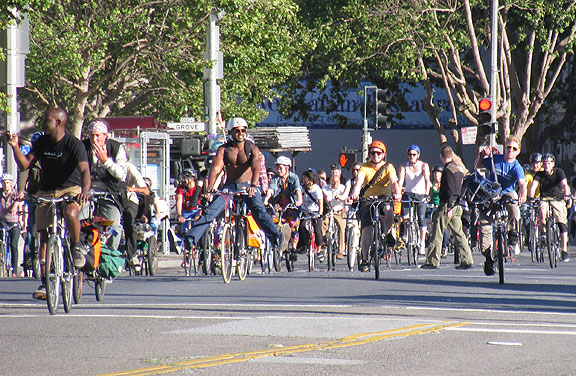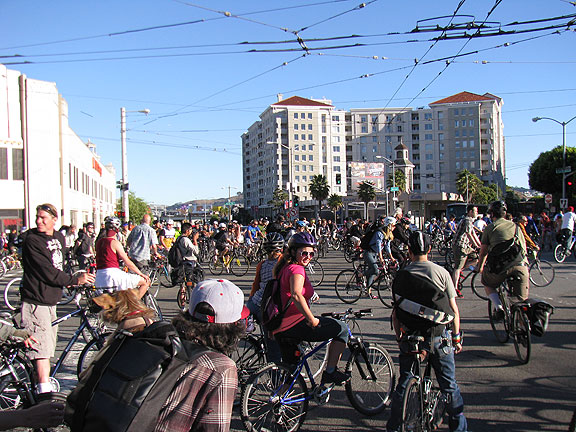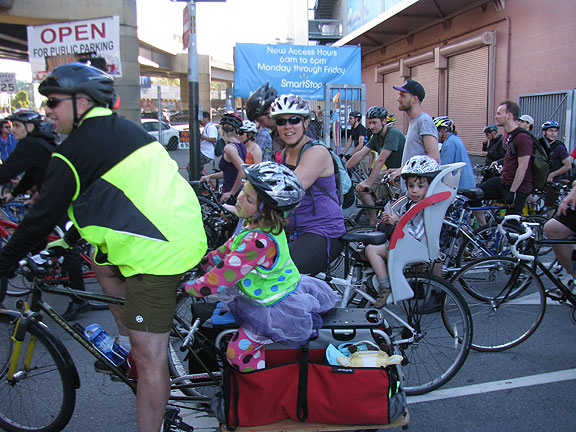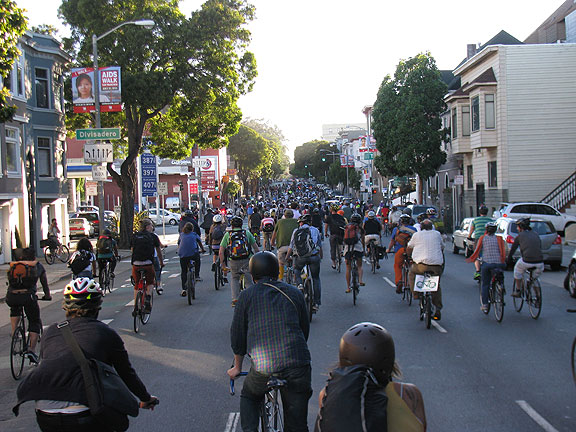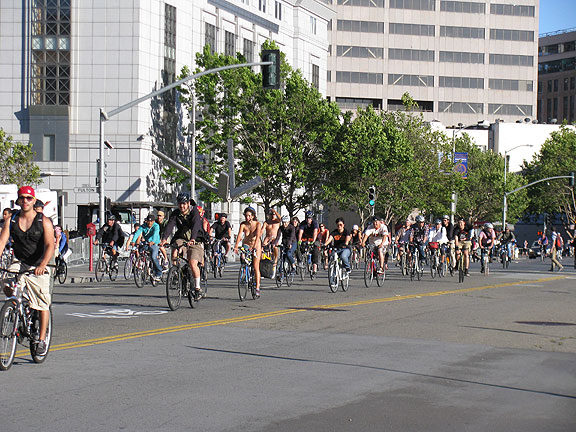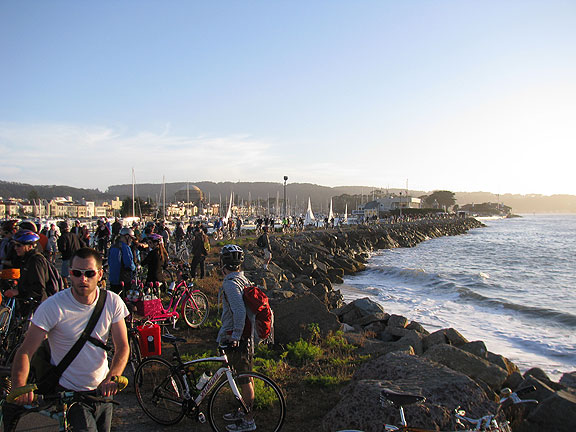It’s the last Friday of July, 2013, and of course San Francisco’s Critical Mass will be rolling around 6:30 or so from Justin “Pee-Wee” Herman Plaza, as it has for the past 20 and a half years. I’m not going today, but it’s not because I don’t generally still show up and usually enjoy myself, but because I’m doing something else at the same time that I bought tickets for.
As it happens this is the same week that Joe Eskenazi’s article “Critical Mass Goes Round and Round” appeared in the SF Weakly. I’ve had a few friends wonder what my take on it is, since he attempts to summarize the political impact of 20 years of Critical Mass in the context of bicycling politics and city transit priorities more generally. I’m also quoted in the piece a few times, a product of an hour I spent speaking with Joe a month ago or so.
I don’t love having a complex set of ideas and experiences reduced to a few out-of-context soundbites that just serve to reinforce my apparent disconnectedness from what matters in terms of the realpolitik of San Francisco. But that’s what mainstream journalism, even or especially in an alt-weekly, will do. Overall I don’t think he did a bad job of capturing the current malaise that besets Critical Mass (a malaise that is only visible to those of us who have long harbored more ambitious hopes for radical social change), and I think he was spot-on in highlighting the severe limits of the narrow corporatist agenda of the SF Bicycle Coalition, both in terms of its self-proclaimed successes and in terms of the actual state of things on the ground in San Francisco for bicyclists.
Critical Mass, of course, is not an organization, and thus has no agenda, and never did. One of the originating impulses for it was the experience many of us had of so commonly being treated as second-class citizens on the roads by motorists and by the shape of the infrastructure itself. Eskenazi suggests that our early years’ “success” was to insinuate into the DNA of the city’s people the awareness that cyclists are here and deserve accommodation. I think that’s basically true. But for me, Critical Mass was always about a lot more than mere bicycling. As he rather drippingly notes, I lament that the SFBC and its gov’t allies “have no particular problem with wage labor,” and they are narrowly focused on simply “getting more people on bicycles.” Bicycling is great for all kinds of intrinsic reasons, but bicycling per se is simply not enough.
Indeed, the bicycle for me was always a transportation choice that was obviously superior to other choices, but insofar as we gathered en (Critical M)asse, it quickly became obvious that much more is at stake. Our paucity of public space and opportunity to gather and meet and discuss anything publicly without being subjected to the endless imperative to buy something immediately rose to the foreground as an important element of why Critical Mass mattered.
In our book “Shift Happens! Critical Mass at 20” we gathered essays from two dozen contributors spread across the world’s cities showing how Critical Mass spread far and wide and repeatedly changed those cities where it appeared in similar ways. As Eskenazi notes, I wrote in my opening essay in that volume that I’d seen a kind of “life cycle” of Critical Mass in different places, usually involving the hopeful, utopian, and open-ended experience that has captivated so many of us lasting about 5 years, give or take. After that the animating spirits of that “golden era” often turn to other ways to pursue their hopes and goals, whether by launching more mainstream advocacy organizations, turning to other activities entirely such as urban agriculture or free software (just as often, of course, activists from those arenas had joined with other cyclists to spur on Critical Mass from its inception, whether in Brazil or Mexico or Italy or Hungary), or beginning DIY skill-sharing “bike kitchens.”
The spate of horizontalist social movements that are continuing to erupt suddenly across the planet, most recently in Brazil, Turkey, Bulgaria, and Egypt, often find Critical Mass cyclists at the heart of those upheavals. This is not to credit CM with being the necessary precursor or essential causal agent, just to note that our shared experiences in making Critical Mass in over 400 cities around the world during the last two decades has already profoundly affected how we think about and engage in politics, civil society, urban planning, and much more.
The fact that San Francisco’s ride is so predictable and often boring, lacking in any internal political discussions, publications, social dialogues, or anything close to what made it so vital in its first five years, doesn’t make meaningless or irrelevant. It is still a gathering point, a place where people meet, where ideas can hatch, and month after month, it’s a training ground for spontaneous self-organization. Though it can seem very trite and repetitive and is too often directed by racers or the cops, it is still the case that every month something completely unexpected COULD happen, and for people on their first or early ride, it can still impart that euphoria we all know so well. I still experience it from time to time and I’ve been riding for 20 years!
Critical Mass doesn’t have to answer to anyone’s measurement about efficaciousness. It is not an instrumentalized experience designed to “achieve” something. It is real life, open and flexible, and as a persistent reality on the last Friday of every month, it is always there to be reclaimed, repurposed, and reanimated by anyone who cares to make the effort. I’m glad it’s still going. It’s not something we do to score political points or to gain any particular demands. It’s an expression of life itself, and it is still a chance to taste however fleetingly a brief moment of another way of life, one not dominated by the frenzied rush to and fro from work and home, not reduced to buying and selling, an experience that is valuable for living it, and smelling it, and sharing it… and nothing more.
